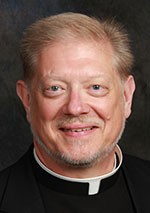That All May Be One / Fr. Rick Ginther
Annual worship service offers chance for faiths to be one in prayer
 The Week of Prayer for Christian Unity (WPCU) is annually celebrated on Jan. 18-25. This period is bracketed by the feast of the Chair of St. Peter and the Conversion of St. Paul. This “octave” (eight days) offers an intense time for prayer “that all may be one.”
The Week of Prayer for Christian Unity (WPCU) is annually celebrated on Jan. 18-25. This period is bracketed by the feast of the Chair of St. Peter and the Conversion of St. Paul. This “octave” (eight days) offers an intense time for prayer “that all may be one.”
At 7 p.m. on Jan. 21, Mount Zion Baptist Church, 3500 Graceland Avenue, in Indianapolis, will host the Christian community of greater Indianapolis for our annual WPCU worship service. A reception will follow. All are welcome.
Each year, the Pontifical Commission for Promoting Christian Unity and the World Council of Churches choose a region of the world whose Christian leaders are invited to prayerfully prepare a prayer service.
Special care is taken in choosing the Scripture passages, symbols, gestures and songs reflective of the region’s history and culture. But these must be universal enough to be used in other regions of the world.
This year’s prayer service was prepared by a committee from the Caribbean region. The committee was comprised of Roman Catholic, Baptist, Anglican, Methodist, Moravian, Presbyterian and United Church of Christ representatives.
The preparers chose Exodus 15:1-21, especially verse 6, “Your right hand, O Lord, glorious in power,” as the scriptural motif. This is known by many as the song of Moses and Miriam, which describes the Israelites’ joy after crossing the Red Sea and being saved by God from the enslavement in Egypt.
For the preparers, the Bible and three sets of chains became integral symbols for this worship service.
The introduction to the service describes the symbols in this way: “The Bible is especially important in the experience of the Caribbean churches. Historically, indigenous and enslaved peoples experienced atrocities perpetrated by colonizers who, at the same time, brought Christianity. Yet, in the hands of the oppressed peoples of the region, the Bible became a primary source of consolation and liberation. …
“Chains are a very potent symbol of enslavement, dehumanization and racism. They are also a symbol of the power of sin which separates us from God and from each other. … During the worship service, the … chains are replaced by a human chain expressing bonds of communion and united action against modern slavery and all kinds of individual and institutionalized dehumanization.”
A song associated with the ecumenical movement in the Caribbean helps to “voice” the brokenness, sinfulness and hope expressed throughout the worship service. “The Right Hand of God” reflects the song of Miriam and Moses. It praises the liberating action of God suffusing the Book of Exodus.
I hope that what has become clear through this column is that a desire for Christian unity must be grounded in desire to acknowledge shared human experience. In this case, it is the shared work of the churches to overcome the shared social challenges facing the people of the Caribbean region.
But it is also the case that their reality speaks to our region’s social justice challenges of enslavement (to sin, possessions, consumerism), dehumanization (poverty as a “fault” of the poor, profit undermining family, ignoring of the common good) and racism (veiled or overt based in ethnicity, religion or national origin).
Come join Archbishop Charles C. Thompson and the leaders of many of our local Christian denominations for this prayer service. All are welcome at 7 p.m. on Jan. 21.
Let us be as one in prayer, that “all may be one.”
(Father Rick Ginther is director of the archdiocesan Office of Ecumenism. He is also pastor of Our Lady of Lourdes Parish in Indianapolis.) †
 The Week of Prayer for Christian Unity (WPCU) is annually celebrated on Jan. 18-25. This period is bracketed by the feast of the Chair of St. Peter and the Conversion of St. Paul. This “octave” (eight days) offers an intense time for prayer “that all may be one.”
The Week of Prayer for Christian Unity (WPCU) is annually celebrated on Jan. 18-25. This period is bracketed by the feast of the Chair of St. Peter and the Conversion of St. Paul. This “octave” (eight days) offers an intense time for prayer “that all may be one.”